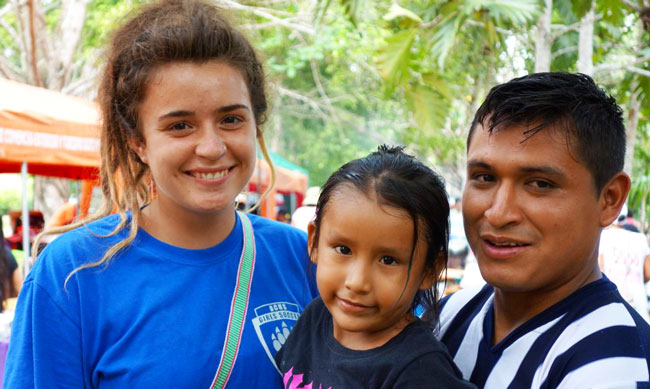“Quieres vender tu iPhone?”
I looked up from my dinner plate piled with rice at my eager-faced 19-year-old Peruvian host brother sitting across the table from me.“Como?” I asked, thinking I had to have misunderstood the question.
“Quieres vender tu iPhone?” he repeated, slower this time.
“Ahhhh,” I responded, trying to buy myself time to think. “No sé…” I racked my brain trying to figure out why Llan would be asking me if I wanted to sell one of the only things I had with me from home. Sometimes it was helpful to play up the language misunderstandings, I figured.
“No sé. Necesito para mis fotos y no sé…” No sé was quickly becoming my go-to response.
Llan smirked and got up from the table. “Ah ya, está bien,” he said, laughing as he left the kitchen.
That was weird, I thought.
My iPhone 5s was one of my limited connections to the city of Lima and to home. It held all my pictures of family, of friends, of travelling around Peru weeks prior and of my time in the jungle so far.
I was about halfway through service in San Roque, after spending six weeks in Lima. San Roque was a small village of about 800 people that was a winding 40-minute uphill drive from the slightly bigger city of Tarapoto. Tarapoto had an airport, restaurants, public cafes and bathrooms – and internet. These were luxuries that San Roque simply didn’t have, but the internet wouldn’t even matter anymore if I didn’t have my iPhone to use it.
One evening a few days later, my 15-year-old brother, Cristian, came in my room. He perched on the end of my bed, as he often did.
“Estás vendiendo tú iPhone?” he asked, in that familiar tone used by boys that age trying to be casual about something.
“Como?! No…” I rushed to try and explain. “Creo que no, tu hermano me pregunto pero creo que no puedo vender.”
He blinked at me.
“Por que?” I asked.
“Porque si lo estas vendiendo, yo lo quiero comprar. Somos mejores amigos que tu y Llan, y creo que yo necesito el telefono mas que el,” he replied.
“Ahhh… pues. No estoy vendiendo!” I said, and changed the subject.
Later that night I was again thinking about what had happened. The brothers had to be talking about my iPhone. How else would word have spread? Could I really sell my iPhone?
My mind drifted. My iPhone 5 wasn’t even my real phone anymore. I had a new iPhone 6 at home in Goshen, tucked away where it wouldn’t be stolen in Lima or dropped in a river in the Amazon jungle. What expectations would selling my phone create for future students if they came to this place, this family again?
I rolled over, tucked my blue, ragged mosquito net back up over the top corners of my mattress, and put it out of my mind.
Over the next few weeks, however, my mind kept returning to my iPhone. I used it for reading, for photos and for internet connection while in Peru, but when I returned to the U.S. I would be done with it. I decided not to say anything to either of my inquisitive brothers while I was still thinking.
One evening I came into my house and walked straight into my room, as I usually did. My oldest brother Avel, 25 years old, sitting cross-legged on the concrete floor with his back leaned against the cement block wall. He never came in here to chat, I thought, so something must be happening.
“Quieres vender tu iPhone?” he asked.
By now this question had been posed to me three times.
“Por que?” I asked.
“Llan me dijo que vas a vender tu iPhone a él, y quiero hacer una oferta mejor!”
“Ahhhh…” I responded again. I couldn’t believe he was obviously trying to make me a better offer than his brother.
“No sé, creo que no…” This was becoming quite routine by now.
Later I thought about the situation again. Clearly my brothers were in conversation about what they thought was happening with my iPhone; stories were spreading.
I didn’t realize, however, quite how far. Later that night one of my service partners, asked me if I was selling my iPhone.
“My brother told me your brother said you were selling your iPhone,” she said, laughing.
I needed to get this situation figured out. I was in the middle of the Amazon jungle trying to survive, not run a business.
The whole idea of doing business with family, especially a host family, was rife with potential to negatively erupt.
The next time the question was posed, I was ready.
“No voy a vender…no voy a vender.”



